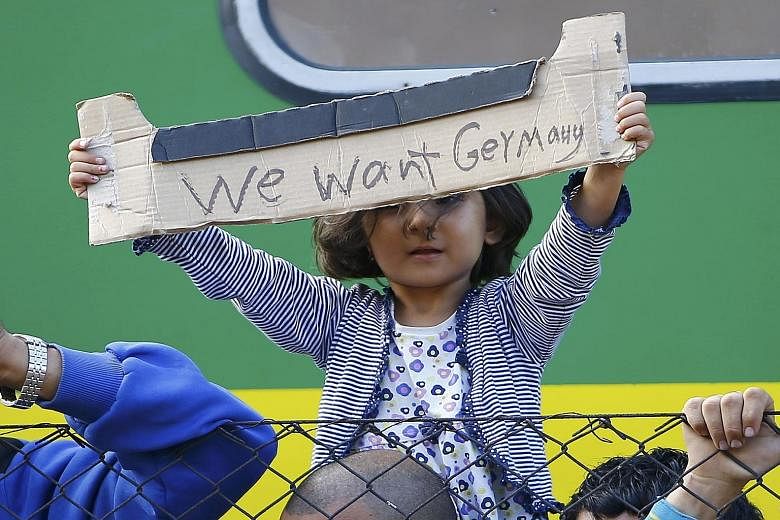BRUSSELS • European Union (EU) leaders, shocked by the horrifying pictures of a drowned Syrian child, have rushed out new proposals to address the escalating migrant crisis, despite deep divisions in the 28-member bloc.
The heartbreaking images of three-year-old Aylan Kurdi brought home the horror of the refugee crisis. But the struggle among European leaders to develop a coherent response to the spiralling crisis has intensified with recriminations about the continent being swamped with Muslims.
The hundreds of thousands of migrants pouring into Europe have posed the continent's third great challenge in the last decade.
Yet, neither of the first two, the still smouldering euro crisis and the war in Ukraine, posed the same degree of divisiveness - between left and right, rich and poor, and East and West.
With tensions growing over how to handle the situation, France and Germany said they had agreed that the European Union (EU) should now impose binding quotas on the numbers that member states should take in, despite having failed to reach such a deal in June.
"That is the principle of solidarity," German Chancellor Angela Merkel said on Thursday. President Francois Hollande of France said he had reached an agreement with Dr Merkel on "a permanent and obligatory mechanism" to allocate migrants across the bloc.
EU foreign ministers were set to meet in Luxembourg yesterday to discuss the escalating crisis, after pressure for action was heightened by the images of the drowned child.
And European Commission president Jean-Claude Juncker will next week unveil a plan to relocate at least 120,000 more refugees to ease the burden on front-line EU nations Greece, Italy and Hungary, a European source said.
EU president Donald Tusk also called on member states to share the resettlement of at least 100,000 refugees - far above the current agreement for 32,000.
But Hungary's right-wing prime minister, Mr Viktor Orban, increased the tension, delivering a series of incendiary comments, saying that "Europe's Christian roots" were being threatened and insisting "the problem is a German problem", not Europe's.
"Nobody would like to stay in Hungary," he told reporters in Brussels on Thursday after talks. "All of them would like to go to Germany."
The German Chancellor rejected Mr Orban's assertions, saying Germany was doing only what "is morally and legally required" of every EU country in accepting its fair share of the migrants.
But Mr Orban rejected the idea of mandatory quotas, as did the Polish and Slovak governments, which said they would accept only Christians, and in small numbers.
The chaos is searingly illustrated in Hungary, with a stand-off that began on Thursday outside Budapest involving hundreds of migrants crammed into a train they thought was bound for Austria and Germany. Riot police halted the train at Bicske, 35km west of Budapest, ordering the migrants to a nearby camp for processing. Scuffles broke out when the migrants refused. Cries of "No camp, freedom!" rang out as the stand-off went into its second day yesterday. Sanitary conditions risked deteriorating fast in the late summer heat.
"We don't know what is going on," said Mr Ahmed Mahmoud, 60, who said he was a former Iraqi military officer who had lost both legs and was trying to join his daughter in Belgium.
"The police told us, get fingerprinted or face jail time. So we gave our fingerprints and they told us we can go. But we can't go to the west."
Hungary also temporarily shut the Roszke border crossing with Serbia yesterday, after 300 migrants escaped from a nearby refugee camp.
Parliament in Budapest was expected yesterday to approve sealing all of the newly fenced border, and creating zones where migrants will be processed and potentially sent back into Serbia.
Russian President Vladimir Putin also weighed in yesterday.
He said on television that Europe's migrant crisis is a predictable result of policies in the Middle East he had long warned against.
Russia is a longstanding ally of embattled Syrian President Bashar al-Assad's regime, which it is continuing to support militarily.
But the West supports the mainstream opposition, which has been overtaken in many parts of the country by groups like the Islamic State in Iraq and Syria (ISIS).
"We in Russia, and your humble servant in particular, several years ago said that there would be big problems if our so-called Western partners followed this mistaken - as I always said - policy."
AGENCE FRANCE-PRESS, NEW YORK TIMES

